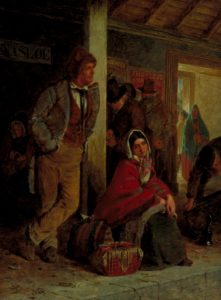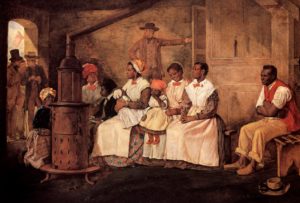
Waiting is ubiquitous in human experience right from our very start. For nine months we gestate in our mother’s womb, waiting to be born. Likewise, at the end of our lives, we wait for death. Every day in a variety of situations, we wait. We wait for the sun to replace the moon, for buds to blossom, for our house to sell, for our carrots to grow. We wait for a lover to call, for the mail to be delivered; we wait for the taxi to arrive and the plane to be on time. We wait in traffic jams and doctors’ offices. We wait for the signs of puberty, the first rattlings of death.
Waiting is colored by the emotion we attach to the experience. We say we feel stuck or pissed, bored or angry. The supermarket line seems to take forever. “Take forever” is one of our favorite descriptors of waiting.
 We wait in public and we wait in private. Waiting is a mental space unlike any other: in waiting we find ourselves in uncertainty, between the anticipated and the hoped for, between stasis and action, and our response to waiting often registers as cranky restlessness.
We wait in public and we wait in private. Waiting is a mental space unlike any other: in waiting we find ourselves in uncertainty, between the anticipated and the hoped for, between stasis and action, and our response to waiting often registers as cranky restlessness.
Journalist Andrea Köhler has written a book called Passing Time: An Essay on Waiting, in which she reflects on aspects of waiting. “What I am interested in is the kind of waiting that falls squarely within the realm of individual experience, which in today’s world, faces the paradox of overabundance of too little time.” The paradox here is something most of us know: that while we pack more and more into our busy lives, we feel more dogged than ever by the pressure to keep up. Under such conditions, waiting becomes maddening, a personal affront.
Köhler reminds us that waiting anticipates loss and the fear of separation. Waiting, she observes, is anxiety’s sister. Using Freud as a guide, she refers us back to childhood, to our first experience of our mother’s absence. We are in a crib. We cry out. Mother does not hear our distress. Waiting for our mother induces terror. Of this primal terror, Köhler writes: “Only a brief instant presumably separates the moment when the child believes his mother to be merely absent from the moment when it thinks she is dead. Whenever we have to wait for someone we love, we are subcutaneously thrown back upon this experience. Thus, waiting evokes the curse of a threat going back to childhood.”
But do we have to think of waiting as passive and anxiety-provoking? Financial writer Frank Partnoy would have us consider the benefits of delay. His book, Wait: The Art and Science of Delay, suggests that rashness is not our friend. Deep reflection requires time. Decision-making requires time and a space in which we can observe, contemplate and process information. Partnoy writes:
“Thinking about the role of delay is a profound and fundamental part of being human. Questions about delay are existential: the amount of time we take to reflect on decisions will define who we are. Is our mission simply to be another animal, responding to whatever stimulations we encounter? Or are we here for something more? Our ability to think about delay is a central part of the human condition. It is a gift, a tool we can use to examine our lives. Life might be a race against time, but it is enriched when we rise above our instincts and stop the clock to process and understand what we are doing and why.”
 What’s our rush? The answer has to do with our relationship to time. Time fleets, races, gallops or drags. We spend time or grieve its absence. Sometimes, time stands still. Technology and modernization have changed how we experience time. As novelist and historian Eva Hoffman writes in Time: “As we move through time with more speed and freedom, temporality becomes increasingly severed from natural cycles of years, days and seasons. In jet travel we conflate night and day without regard to the twenty-four-hour cycle. . . . But our cognition of time is no longer even linked to the time through which we physically move. Rather, our experience of temporality is becoming increasingly deterritorialised and virtual.”
What’s our rush? The answer has to do with our relationship to time. Time fleets, races, gallops or drags. We spend time or grieve its absence. Sometimes, time stands still. Technology and modernization have changed how we experience time. As novelist and historian Eva Hoffman writes in Time: “As we move through time with more speed and freedom, temporality becomes increasingly severed from natural cycles of years, days and seasons. In jet travel we conflate night and day without regard to the twenty-four-hour cycle. . . . But our cognition of time is no longer even linked to the time through which we physically move. Rather, our experience of temporality is becoming increasingly deterritorialised and virtual.”
Waiting can be empty and meaningless or full of richness and meaning. Engagement with the present moment, to what’s right here in front of us—the tree next to the bench at the bus stop where we sit waiting, the child’s quizzical face in the waiting room—offer opportunities to acknowledge and feel the life pulsing within and around us. Buddhist monk and teacher Thích Nhất Hạnh teaches us that when we see a flower, if we pause, wait, and cultivate a meditative moment to look deeply into that flower, we will see not only its shape and color, but we see the sunshine, rain and soil that are also part of the flower and part of us as well. This “looking deeply into” can become a practice while we wait, wherever we are. We can bring our awareness to the quality of clouds while we are in crawling traffic; we can sit with our morning coffee and savor its aroma, feel the weight of the mug in our hands. In these moments when we abide with ourselves, the urge to do, to be somewhere else, subsides. Our breath, our heartbeats slow down. We are not waiting for time to pass; waiting is our friend.
 French philosopher Gaston Bachelard takes us a step further in considering the necessity and profundity of time suspended. Tempo giusto, the unrushed time of childhood, or what Bachelard calls reverie, a time-outness in which the preoccupations of everyday life and worries are swept aside and “time no longer has any yesterday and no longer any tomorrow.”(The Poetics of Reverie: Childhood, Language, and the Cosmos).
French philosopher Gaston Bachelard takes us a step further in considering the necessity and profundity of time suspended. Tempo giusto, the unrushed time of childhood, or what Bachelard calls reverie, a time-outness in which the preoccupations of everyday life and worries are swept aside and “time no longer has any yesterday and no longer any tomorrow.”(The Poetics of Reverie: Childhood, Language, and the Cosmos).
Beloved poet Mary Oliver is our spirit guide in reminding us to remain open to the world’s dazzlement; that is, to pause, wait and wonder. To allow the mundane to show us its enchantment. Here is her famous poem “Wild Geese” from her book Dream Work. Poetry opens us to a lyric moment, into the timeless realm beyond waiting where image, music, and revelation meet. Next time you think you might be in for a wait, take a book of poetry with you. You may find that your mind will be happy you did.
Wild Geese
You do not have to be good.
You do not have to walk on your knees
for a hundred miles through the desert repenting.
You only have to let the soft animal of your body
love what it loves.
Tell me about despair, yours, and I will tell you mine.
Meanwhile the world goes on.
Meanwhile the sun and the clear pebbles of the rain
are moving across the landscapes,
over the prairies and the deep trees,
the mountains and the rivers.
Meanwhile the wild geese, high in the clean blue air,
are heading home again.
Whoever you are, no matter how lonely,
the world offers itself to your imagination,
calls to you like the wild geese, harsh and exciting –
over and over announcing your place
in the family of things.
This post appeared in a slightly different form on Dale’s blog on Psychology Today. You can find all of Dale’s blog posts for Psychology Today at